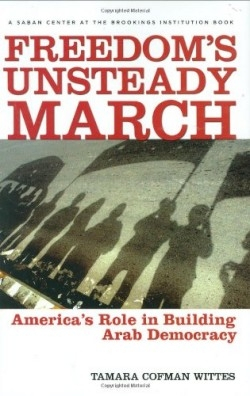
Freedom's Unsteady March
America's Role in Building Arab Democracy
Open warfare, occupation, bombings, militant armed movements, insurgencies, weak central governments, authoritative dictatorships, and millions of average people struggling for survival will greet the forty-fourth President on inauguration day in January 2009. The new US leader will find dangerous and complicated challenges in the area known as the “Arab World.” Hundreds of opinions about the best foreign policy strategies will bombard the administration and one of Washington’s most influential centrist think-tanks, the Brookings Institution, is starting now to try to influence the next era of US/Arab relations.
Arab governments are at a crossroads, neither able to maintain the status quo (oil money for funding social programs, political repression, and nationalist rhetoric), nor willing to surrender power to the needs and desires of the population. Wittes, the editor of How Israelis and Palestinians Negotiate, former director of the US Institute of Peace (an official government institution), and a senior fellow in the Saban Center for Middle East Policy at Brookings, believes that calculated US assistance can bring about genuine democratic change.
Despite what Wittes and others describe as the negative consequences of the Bush administration’s efforts to impose or encourage voting in several countries, such as the election victories of Hamas in Palestine, Hizballah in Lebanon, and religious Shiites in Iraq, she believes that greater democracy is the only way to reduce tensions and create a safer world for Western countries. By supporting genuine non-governmental institutions where opposition views can be expressed, legalizing political parties (including Islamist parties), and supporting a free press to hinder government repression, Wittes believes that disgruntled citizens will be freer to make informed choices. While the present governments have resisted similar efforts in the past, growing militancy will force change.
Some previous US efforts have stumbled. For instance, President Bush lobbied Tunisia to allow a free press. However, often short-term goals trump democratic principles: “…in 2004, several Saudi journalists lost their jobs or their columns after they questioned the influence of extremist clerics in politics and the exclusion of women from public life. No exhortations on their behalf were issued from a Washington podium.”
While there will be great resistance, particularly to the privatization of the oil industry, which will sharply curtail the government’s ability to provide social services to the people, the book is an intelligent and thorough analysis that may help guide the next administration through the extreme challenge of furthering US interests in the Middle East.
Reviewed by
Deirdre Sinnott
Disclosure: This article is not an endorsement, but a review. The publisher of this book provided free copies of the book to have their book reviewed by a professional reviewer. No fee was paid by the publisher for this review. Foreword Reviews only recommends books that we love. Foreword Magazine, Inc. is disclosing this in accordance with the Federal Trade Commission’s 16 CFR, Part 255.
